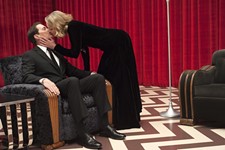A Heavy 'Heart'
HBO adaptation makes the case for rage
By Brandon Watson, 3:45PM, Fri. May 23, 2014

I’ll admit I had strong reservations about watching Ryan Murphy’s film version of Larry Kramer’s The Normal Heart. The play had always been a personal manifesto, molding how my sexuality determined my identity. Even when I disagreed with his rancor, Kramer was a hero.
It seemed inevitable that gay culture's most acerbic contrarian would be reduced to an institution – and that’s just the thing Kramer has made a life's work of crushing.
The fear was in Kramer’s bite being used to chew the cud. The urgent plea of The Normal Heart gets fossilized. The progressive viewership gets a placebo for all their cultural unease. Emmy gets to consider another act of gay-for-pay "bravery." It all becomes a “very important picture,” and the still-relevant message gets lost as Hollywood pats itself on the back.
Kramer’s play wasn’t mere storytelling. It was a call to arms to a gay community that had lost its will to riot. It was a template for the radicalism of Queer Nation and ACT UP. Today, it has much to teach a generation of young gay men discovering a post-epidemic liberation. No doubt many articles on the film will touch on the intrinsic worth of chronicling the bad ole days of AIDS, but The Normal Heart isn't just memorial. It’s a challenge to history not to repeat itself.
With HIV contraction rates rising and a global push against LGBT rights, there’s still plenty of reason to be angry. And it turns out that Hollywood couldn’t dampen that one bit. Fury charges every frame of Kramer’s screenplay. The Normal Heart does the sly work of dramatizing a debate that is rarely discussed within gay culture, much less laid bare in a prestige HBO project. The Fire Island of the film's opening scenes may have been replaced by the grid of hookup apps, but Normal argues that gay political rage still cannot be lost in the wub-wub of a poppers sniff.
It's not exactly the stuff of a Glee episode. But in Normal, Murphy eschews his usual "see what sticks" style. His direction is earnest, quickly cutting to the marrow. Within minutes, a post-Stonewall gay paradise collapses and writer Ned Weeks (Mark Ruffalo) finds himself battling to convince anyone to notice. While many in the gay community refuse to acknowledge the spreading disease, Weeks becomes obsessed – eventually helping to create a health organization dedicated to combatting "gay cancer." Kramer does not coddle his fictional self. Weeks is pugnacious and egotistical. Activism, after all, is not about being well-liked.
While fully realized, the supporting characters also serve as a microcosm of the gay body politic. Closeted banker Bruce Niles (Taylor Kitsch) becomes the "safe" face of the Gay Men's Health Crisis. His devotion to all things moderate can still be seen in latter-day organizations like the Human Rights Campaign. Ned's brother Ben (Alfred Molina) play out the complicated relationship the LGBT community has with allies. He provides financial support, but never fully embraces equality. The scenes between Ned and his older brother are an indictment of conditional support.
To his credit, Murphy never loses sight of the polemical. Weeks' monologues gain urgency as he rails against the government, the media, and eventually the institution he helped create. The growth of the GMHC is played against the backdrop of Week's relationship with Felix Turner (Matt Bomer), a New York Times lifestyle reporter who Weeks' initially lobbies for press coverage. That relationship becomes romance, bringing a heat rare in Hollywood's neutered depiction of gay men. More importantly, it brings humanity to what could have been dry agitprop.
As AIDS begins to take its toll, the camera does not flinch from Turner's deterioration. Through that wasting away, far too familiar to those who lived through the epidemic, we come to understand Weeks' (and Kramer's) rage. The organization he helped create had grown from a single hotline to a call center, but it still couldn't keep his lover from dying.
The Normal Heart is not a victory lap. Stars may stud the new production, but they can’t detract from its weight. It turns out my fears were unfounded; it still can jolt the complacent into being minor Ned Weeks. Almost 30 years after the play first debuted, there's still power in acting up. If that becomes institutional, well, it’s about damn time.
'The Normal Heart' debuts Sunday, May 25 at 9pm ET on HBO.
A note to readers: Bold and uncensored, The Austin Chronicle has been Austin’s independent news source for over 40 years, expressing the community’s political and environmental concerns and supporting its active cultural scene. Now more than ever, we need your support to continue supplying Austin with independent, free press. If real news is important to you, please consider making a donation of $5, $10 or whatever you can afford, to help keep our journalism on stands.
Mark Fagan, June 23, 2017
Sept. 15, 2017
Television, The Normal Heart, Larry Kramer, Ryan Murphy, HBO, HIV/AIDS, LGBT, Mark Ruffalo, Matt Bomer, Julia Roberts, Jim Parsons, Taylor Kitsch










